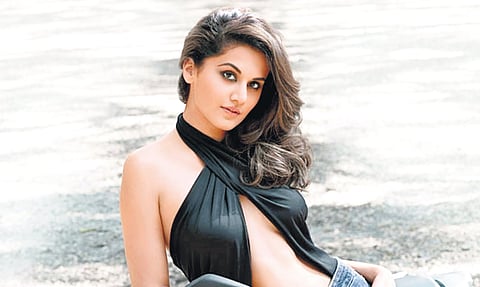Taapsee Pannu reflects on reprising Rani in 'Phir Aayi, Haseen Dilruba', her evolution as an actor
You are back as Rani in Phir Aayi, Haseen Dilruba on Netflix. She is the quintessential femme fatale, a woman who is aware of her sexuality, is unapologetic, and can even kill for what she wants. What was it like revisiting her after four years?
It was very unlike me to be Rani; nor was I the first and the obvious choice for the film. I was initially not sure about being Rani either, because I am nowhere close to her as a person and neither could I comprehend her mind space. But, the character turned out to be a gift that kept giving me love. I went in fully blank to play her and had apprehensions that either she would be a miss, or she just might bring in the wow factor. I had set myself up for failure. But, when it clicked, it became a personal victory of sorts—the fact that I put myself so out of my comfort zone, and still managed to be convincing. That is a huge victory for any actor. With Rani, I also explored a part of me that I didn’t know existed. Playing the seductress, someone using her sexuality, which I hadn’t done on or off screen. So, I discovered that I could be this person too. So, there is a sort of affection for this character, I guess.
This is your fifth collaboration with writer Kanika Dhillon after Manmarziyan, Rashmi Rocket, Haseen Dilruba and Dunki. What is the creative synergy between the two of you?
It has been very organic. We didn’t intend to make these many films together. I remember when I was working on Rashmi Rocket, I wanted to take it to her to write the dialogues. She contacted me for Haseen Dilruba, and like this, we just ended up working together, and you will see a lot more from the two of us. It’s a belief; she knows I will take the leap of faith with her writing, and I trust her to hold me and have my back. She understands the risk I want to take with my characters. She is always telling me that I will make you do the unexpected. She likes to put me in the deep end, and I thrive on that.
When Haseen Dilruba was first released on Netflix, there were mixed reactions. Several critics felt we were glorifying toxic relationships like the one between Rani and Rishu (Vikrant Massey). Your thoughts.
We are treading a fine line between reflecting and affecting society as people in this industry. If we don’t show a reflection of what society is, we are called out for being part of nonsensical and unrelatable narratives. When we mirror real life, then we are called out for promoting these things.
We are caught in a precarious situation. I feel the world in the film and its characters are pretty much real, they are echoing the world we live in. You need to open the newspaper every day to see the bizarre stuff people end up doing. Regarding glorifying toxic relationships and misogyny, you need to see the film from the perspective of the characters; their actions are not making their lives better. It is not a happy ending. A relationship between a husband and wife cannot be happy if he has severed his arm for her, and they are absconding. So, we are not endorsing anything.
It’s been 11 years since your debut in Chashme Baddoor. You have, over the years, created your genre of cinema with movies such as Pink, Saandh Ki Ankh and Thappad. How do you go about choosing roles?
I know many say twisted, quirky, complex and out-of-the-box genres are what I thrive on. I have now realised that the things that I do are for my happiness, and it’s not to prove a point. It is about setting up challenges for myself and demonstrating my abilities and aptitude. I now need to go beyond the limitations and see myself grow as an artiste and human.
What does your husband (Mathias Boe) have to say about the many shades of Taapsee we see on screen?
We had been together for 11 years before we got married. He has seen more sides of me than one has seen on screen and has chosen to stay, so that is a positive. We complement and understand each other well.

